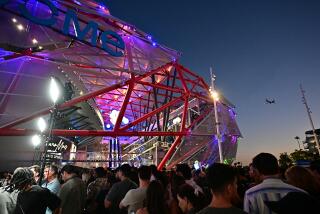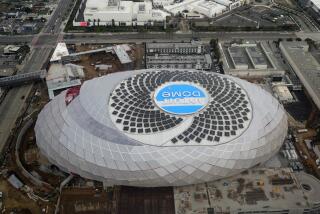Behind the 8 Ball : Pool Halls Shooting for a New, Upscale Image
In 1911, a leading pool table manufacturer mounted an all-out publicity campaign to erase old-fashioned notions that the game attracted a less than wholesome crowd.
Eighty-one years later, pool hall owners from Northridge to Sherman Oaks to La Puente say they are still trying to convince their neighbors that billiards are not evil.
“When they hear pool , they think of a prostitution place or something associated with violence,” said Raymond Arjmand, a land-use consultant representing several San Fernando Valley pool halls. “The billiard cafe that is coming into fashion is entirely different than the ones that were dark and full of smoke and violence.”
Indeed, many of the city’s plusher pool halls cater to a “yuppie” clientele with cappuccinos and French gateaux, classical music and nonsmoking rooms.
String quartets play chamber music in the Hollywood Athletic Club. Mahogany wainscoting provides ambience at the L.A. Society Billiard Cafe in Tarzana. And fashion shows are booked at On the Break Grille and Sports Club in Huntington Beach.
But many residents don’t buy the image of the ‘90s club, worrying that the pool halls moving into their neighborhoods will be dank dens of sin.
“If you look in the window, you see the clientele they’re catering to and it makes you wonder,” said Lynn Solky, who lives near the Sherman Oaks Billiards Club. “You see people with funny hair. It’s not your sophisticated Sherman Oaks resident.”
The supposed unsavoriness of those who wield pool cues is pooh-poohed by players like Paul and Elayne Klein, Encino residents who married after they met over billiards 23 years ago. They keep romance alive with weekly forays to the Sherman Oaks Billiards Club.
“Uh-oh, we’re the element,” homemaker Elayne Klein joked.
“Yeah, we’re coming in from Encino,” Paul Klein said, shaking his head.
*
To be sure, some homeowners judge pool halls no differently than nightclubs or coffeehouses or churches--evaluating them only on whether they cause parking hassles, traffic snarls or noisy disturbances.
Others, who remain doubtful of the halls’ new chic images, find support for their skepticism among officials such as Los Angeles Police Sgt. Michael Jackson. Jackson, assigned to the Wilshire Division’s vice squad, said during his 25 years on the force “pool halls have always been a problem.”
City leaders have taken the cue from residents who want to put the brakes on breaks. They have proposed two separate ordinances that would impose stricter regulations on pool halls, which now only need a police permit and the properly zoned location to start the balls rolling.
One motion, introduced in 1989 by council members Ruth Galanter and Nate Holden, would force pool halls to close between 2 a.m. and 6 a.m. and ban them from within 500 feet of residential or agricultural neighborhoods. It is still being reviewed by the city attorney’s office.
The other, introduced last month by Councilman Hal Bernson, would require pool halls to obtain a conditional-use permit. That process would give the city, and homeowners, more power to regulate pool hall hours, parking and other aspects of their operations.
Bernson’s motion was prompted by outrage that swept through a Northridge neighborhood after the Billiard Connection posted signs in May advertising its opening on Devonshire Street.
Neighbors and officials at nearby Pinecrest elementary school feared that the establishment would lure loiterers who would get into drunken brawls and leer at the school’s female summer camp counselors.
“I used to run around with some boys, and we played pool for beers and money,” said a reformed Bob True, 58, who lives nearby. “It didn’t make a difference how nice we tried to be, we always got in a fight because pool and beer and betting don’t mix.”
The community relaxed a bit only after successfully blocking the hall’s request for a license to serve beer.
The reaction is common throughout the city, said police detective Richard Rudell, supervisor of the police commission’s permit processing section, which has reviewed applications for the 498 poolrooms that now exist in the city.
“This is a citywide phenomenon,” Rudell said.
“Usually the day it’s posted, passersby will spy that thing and say, ‘We don’t want a poolroom in River City. This is something that’s going to be a detriment to the neighborhood. We want to protest.’ And protest they do.”
Why all the fuss about a game that Shakespeare mentioned in “Antony and Cleopatra” and George Washington played?
Pool historians trace it to the late 1800s when managers of off-track betting businesses decided to install billiards tables to amuse customers between horse races.
The clients were soon betting on the games, with the winner getting the money players had “pooled.” Hence, the derivation of the game’s American name--and the beginning of its negative image, historian John Lewis said.
In 1911, the Brunswick Corp. of Wisconsin tried to counteract the stereotype by referring in ads to pocket billiards rather than pool. The company ran pictures featuring women players and advertised the game as a family sport.
“Nowadays, the Brunswick Home Table is the family playground,” a 1917 advertisement read. “When school lets out, it quickens home-bound footsteps.”
But the earlier perceptions persisted, strengthened by stereotypes of the dark, smoky rooms of the 1950s, when “quite a bit of gambling” still occurred, Lewis said.
The ideas were reinforced in the 1961 movie “The Hustler,” in which Paul Newman played Fast Eddie Felson. And even today, television and movie poolrooms are often the setting for betting and brawls.
Pool proponents are waging public relations campaigns to prevent people from being snookered by such stereotypes.
The Billiard Congress of America, a nonprofit organization dedicated to promoting pool, offers a 10-minute videotape showing upscale poolrooms and interviews with customers.
Dick Obayashi said he mailed it to residents protesting the 39-table pool hall with a video arcade and Japanese restaurant he proposed for a La Puente mall. Residents still battled him through five public hearings before a permit--with a number of restrictions--was granted last week.
It seems many homeowners would rather protest pool than play it. Even a single table draws fire.
Petitions flew through a neighborhood of single-family houses in Studio City when Oil Can Harry’s, a popular country-Western bar, recently applied to install one table that owner Burt Charrot said his customers “had been hounding” him to get.
Many neighbors say they opposed the pool table to gain leverage and force the bar to police patrons who park on their streets and make noise late into the night.
But just the word pool was enough to trigger some people’s signatures.
“I really don’t have any objections to them having a bar, but a pool hall--I think it attracts a different element,” said a 65-year-old resident who requested anonymity.
It was apparently that same concern that prompted protests of a million-dollar pool club proposed for the swanky Beverly Center, east of Beverly Hills. Backers of the 6,029-square-foot Westside Billiards Cafe hope that a high-quality Continental restaurant and amenities like valet parking will attract the area’s upper crust.
But six people who wrote to the police commission, which has not reached a decision, have other ideas about whom the pool hall would attract.
“I am a frequent visitor to this area, and I do not believe that billiards or pool is appropriate for the Beverly Center, as this venue can attract a less than desirable element,” Elsie Astrow wrote in a July 7 letter.
Such pool hall opposition does not end once a permit is granted. Several groups have recently protested applications by pool halls in Northridge, Tarzana and Sherman Oaks for conditional use permits to serve beer and wine.
“Our broad advice in the planning department is be content with the pool,” zoning administrator Jon Perica said. He said that some pool halls are well-run, but that the sport does not seem to mix well with alcohol.
He recently denied applications by the Sherman Oaks Billiards Club and the L.A. Society Billiard Cafe in Tarzana to serve wine and beer. They are appealing the decisions.
In both cases, he said, the surrounding areas had high crime rates and more alcohol outlets than recommended by the state Department of Alcoholic Beverage Control. Perica said there were already problems at the Sherman Oaks Billiards Club--an 18-table hall brightly lit with giant beer-bottle lamps.
In May, customers from the pool hall got into a dispute outside the site and shots were fired, Perica’s report said. Neighbors also complained of hearing screeching cars and profanity.
“They’ve shown they’re like the old image,” said Richard Close, president of the Sherman Oaks Homeowners Assn.
Owner Nick Amirgham denies the claim, laying the blame on the misperception of pool. David Ashouri believes the mind-set also is the main factor in protests against a liquor license for his cafe.
Residents say they worry about its proximity to Taft High School six blocks away.
“There’s a connotation with the pool hall that could include undesirable people frequenting it, influencing our youth of the community,” said Bob Gross, president of the Woodland Hills Homeowners Organization. “To add alcoholic beverages to that would add just another step in the wrong direction.”
Not everyone agrees. Robert Seghi, a 27-year-old aviation technician from Van Nuys, said he started playing pool six months ago because of the Tarzana club.
Each night, he said, he plays a couple of games of nine-ball, relaxing to the sounds of piano music. He said he is comfortable in the air-conditioned rooms with forest-green carpeting and brass trim.
“I don’t see the problem,” he said. “All I see is another excuse for a lot of snobby south-of-the-boulevard people to turn up their nose at something else.”


